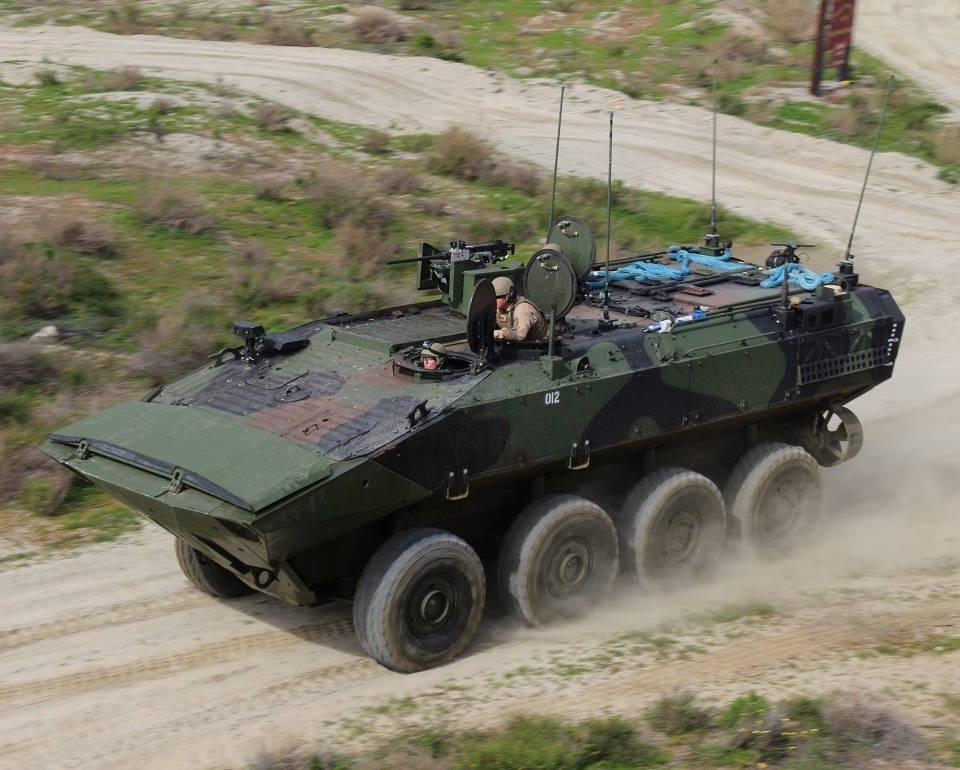|
Marine Corps Begins Fielding Amphibious Combat Vehicle
by Matt Gonzales, U.S. Marine Corps Systems Command
December
18,
2020
The Marine Corps’ new Amphibious Combat Vehicle has achieved two
new major milestones.
On November 13, 2020 the Marine Corps’
Capabilities Development Directorate approved the Initial
Operational Capability of the ACV. Marines with 1st Marine Division
aboard Marine Corps Base Camp Pendleton, California, were the first
to receive the vehicle.
The Program Manager Advanced
Amphibious Assault program office at Program Executive Officer Land
Systems manages the system.
“We’re providing Marines with a
modern, armored personnel carrier that offers tremendous capability
with respect to survivability,” said Col. Kirk Mullins, program
manager for Advanced Amphibious Assault at PEO Land Systems. “The
ACV gives the Marine Corps a capable platform operational across the
full-range of military operations.”
Then, on December 8, 2020
Assistant Secretary of the Navy (Research, Development and
Acquisition) James Geurts approved the vehicle for Full-Rate
Production. This means the Marine Corps can build and field higher
quantities of the ACV at a sustained rate over the next several
years.
What is the ACV?
The ACV is a next-generation, eight-wheeled vehicle designed to
move Marines from ship to shore. The vehicle will be the primary
means of tactical mobility for the Marine infantry battalion at sea
and ashore, replacing the Corps’ aging Assault Amphibious Vehicle.
|

February 28, 2020 - Marines from the Amphibious Combat Vehicle new equipment training team complete an operator course in the vehicle. NETT Marines train to become subject matter experts on new equipment, such as the ACV, in order to teach other Marines how to maintain and operate newly-fielded equipment. In addition to instructing Marines, the NET team reviews and provides input to training manuals and standard operating procedures, help develop ranges and plan field operations for Marines. (U.S. Marine Corps photo by Ashley Calingo)
|
The ACV provides organic, direct fire support to dismounted
infantry. The vehicle’s ability to leverage waterways to carry
Marines and equipment make it well-suited for various operating
environments, including Expeditionary Advanced Base Operations.
It is net-ready, secure, interoperable, operationally effective
and built for future growth. In the future, the Corps intends to
develop, procure and field three additional variants that specialize
in command and control, recovery operations and increased firepower.
“The fielding of the ACV is significant because we’re replacing
the AAV, which has been effective for decades but was fielded in
1972,” said Mullins. “We’re providing Marines with a modern, more
capable combat vehicle that is more adaptable to today’s
battlefield.”
Col. David G. Bardorf, the director of Ground
Combat Element Division at the Marine Corps’ Capabilities
Development Directorate, said the ACV has progressed significantly
since its initial requirements discussions in 2014. Combat
Development and Integration was responsible for developing the
requirements set that would be needed to replace the older platform.
"Reaching IOC is a testament to those involved in this program
and the constant communication between the stakeholders:
requirements, program managers, and [the vendor],” said Bardorf. “In
the end, the Marine Corps is receiving an upgrade in capability
ahead of schedule. We look forward to the program moving forward
towards Full Operational Capability."
Mullins said the
vehicle is projected to reach FOC in fiscal year 2028.
Marines Excited For New Vehicle
In 2019, PEO Land Systems
oversaw extensive testing involving the ACV that confirmed the
vehicle's ability to not only take on challenging surf, but also
complete a long swim from ship to shore. The testing also indicated
that the ACV has greater survivability and mobility than the AAV.
In 2020, Marine Corps Operational Test and Evaluation Activity
performed independent operational testing involving the ACV’s
achieved suitability, effectiveness and survivability. Results from
the assessments, as well as feedback from Marines trained to employ
the vehicle, came back positive.
Mullins believes the ACV
achieving IOC and FRP is a significant achievement for the Marine
Corps, as Marines will receive an innovative vehicle that further
supports their missions in various combat environments for years to
come.
“As program manager, I’ve spent a lot of time speaking
with Marines who have trained with this vehicle in a variety of test
environments,” said Mullins. “The feedback we’ve consistently
received has been overwhelmingly positive. Marines seem to really
love the vehicle.”
The U.S. Marines |
Marines - The Few, The Proud |
Our Valiant Troops |
Veterans |
Citizens Like Us
U.S. Marines Gifts |
U.S. Marine Corps |
U.S.
Department of Defense
|
|



